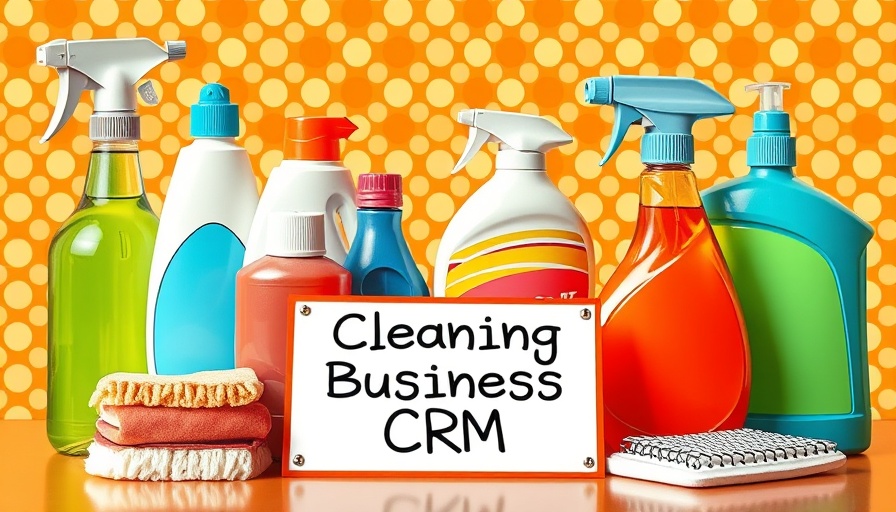
Unlocking the Benefits of CRMs for Cleaning Businesses
In 2025, the world of cleaning businesses has evolved beyond conventional strategies, making Customer Relationship Management (CRM) systems a crucial asset for success. Just as a well-run cleaning service relies on thorough preparations and systemic approaches, a sophisticated CRM can turn mere operational tasks into streamlined processes. It’s not just about managing clients but cultivating relationships, enhancing communications, and ensuring that the intricate demands of the business are met with efficiency and sophistication.
The Unique Challenges of the Cleaning Industry
Cleaning businesses face unique logistical demands. From managing mobile crews to tracking recurring jobs, the hurdles can be substantial. For small and medium-sized business owners, finding a CRM solution designed specifically for these needs is paramount. Generic CRM systems often lack the essential features required for cleaning services, such as tailored scheduling, invoicing based on service frequency, and customer follow-ups.
Top CRMs Tailored for Cleaning Companies in 2025
As we dive into the list of the five best CRMs for cleaning businesses in 2025, it’s important to emphasize their pivotal features:
- HubSpot CRM: Known for its user-friendly interface, HubSpot offers extensive tools for leads management, email marketing, and service automation. It’s an ideal choice for those starting or scaling their business.
- Jobber: This CRM specializes in job scheduling and invoicing, making it perfect for cleaning companies that require precise tracking of services.
- Housecall Pro: A mobile-friendly option that allows real-time updates and communicates with clients seamlessly.
- Zoho CRM: A customizable platform that allows businesses to create tools tailored to their specific cleaning services.
- Cleaning Business Software: Specifically engineered for cleaning businesses, this software integrates scheduling, invoicing, and client management all in one.
Why Choose a CRM?
The adoption of CRM systems in cleaning businesses isn't just a trend; it's becoming the standard. A recent study highlighted that a staggering 91% of companies with more than ten employees utilize CRM software, indicating a significant shift towards better customer management and operational efficiency.
With tools like automated reminders, optimized staff scheduling, and comprehensive client profiles, CRMs can dramatically enhance customer satisfaction. For instance, using a CRM can reduce no-show rates by sending automated reminders to clients, ensuring that appointments are honored.
Choosing the Right CRM for Your Cleaning Business
When selecting a CRM, a systematic approach can help in making the right choice. Here are some considerations:
- Identify Your Needs: Determine whether you require job scheduling, invoicing features, or email marketing tools.
- Consider Mobility: Since cleaning professionals often work on-site, ensure that the CRM offers a mobile-friendly interface.
- Evaluate User Support: Look for platforms that provide excellent customer support as you transition into using the CRM.
Actionable Insights for Implementation
Once you've chosen your CRM, the next steps involve proper implementation and maintenance. Start by training your team to familiarize themselves with the software. A well-trained team can leverage the CRM to its fullest potential, ensuring smoother operations and happier clients.
Regularly assess how the CRM is serving your business. Are there features you're not using? Are there additional tools you need? Keeping the CRM up to date with your business requirements will yield the best results.
Frequently Asked Questions
What is a CRM? A CRM (Customer Relationship Management) system helps businesses manage client relationships and optimize their workflows.
Do I need a specific CRM for my cleaning business? Yes, a CRM tailored for the cleaning industry will offer features uniquely designed to enhance operations.
Conclusion: Seize the Opportunity
In a rapidly evolving marketplace, now is the time for cleaning businesses to adopt a CRM solution that meets their specific operational needs. By leveraging the right technology, you're not just enhancing your efficiency; you're also positioning your business as a reliable service in a competitive landscape. As you consider the best options, remember that the right CRM can elevate your business practices, improve client satisfaction, and ultimately, increase profitability.
To explore more about CRM systems and how they can revolutionize your cleaning business in 2025, take action today.
 Add Row
Add Row  Add
Add 




Write A Comment